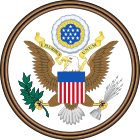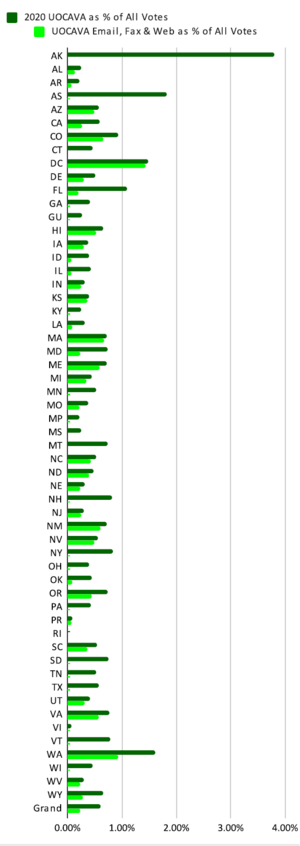Uniformed and Overseas Citizens Absentee Voting Act facts for kids
 |
|
| Long title | An Act to consolidate and improve provisions of law relating to absentee registration and voting in elections for Federal office by members of uniformed services and persons who reside overseas. |
|---|---|
| Nicknames | Uniformed and Overseas Citizens Absentee Voting Act of 1986 |
| Enacted by | the 99th United States Congress |
| Effective | August 28, 1986 |
| Citations | |
| Public law | 99-410 |
| Statutes at Large | 100 Stat. 924 |
| Codification | |
| Titles amended | 42 U.S.C.: Public Health and Social Welfare transferred to 52 U.S.C.: Voting and Elections |
| U.S.C. sections created | 42 U.S.C. ch. 20, subch. I-G § 1973ff et seq. transferred to 52 U.S.C. §§ 20301–20311 |
| Legislative history | |
|
|
The Uniformed and Overseas Citizens Absentee Voting Act (UOCAVA) is a U.S. federal law. It helps U.S. citizens living outside the country vote in federal elections. This law makes sure that all U.S. states and territories allow these citizens to register and vote by absentee ballot.
President Ronald Reagan signed this act into law on August 28, 1986. It is also known as Public Law 99-410.
This act covers several groups of people:
- Members of the U.S. Uniformed Services (like the Army, Navy, Air Force)
- Members of the U.S. Merchant Marine
- Their eligible family members
- U.S. citizens working for the federal government who live outside the U.S.
- Other U.S. citizens who live outside the United States
The UOCAVA also offers a special backup ballot called the Federal Write-In Absentee Ballot (FWAB). Voters can use this if they asked for their regular ballot but did not receive it in time. Sending UOCAVA forms and ballots, including the FWAB, is free.
It is important to know that this act mainly applies to federal elections. However, some states and territories also let these citizens vote in their state and local elections. Before 1986, voting from abroad was possible but rules varied a lot.
Contents
Helping Overseas Voters: The FVAP
The Federal Voting Assistance Program (FVAP) is a part of the Department of Defense. It is in charge of managing the UOCAVA. The FVAP works to help U.S. citizens worldwide understand their right to vote. It also makes it easier for them to vote and helps keep elections fair.
How Overseas Citizens Vote
The UOCAVA allows citizens to get their ballots using electronic methods. This can be through email, fax, or a special website. However, twenty states still require ballots to be sent back by mail.
Some states allow ballots to be sent back through secure websites. These states include Arizona, Colorado (if needed), Missouri, and West Virginia. In recent years, researchers found some security issues with online voting systems used for UOCAVA.
Many other states allow ballots to be returned by email or fax. These include Alaska, California, Delaware, Florida, Hawaii, Indiana, Iowa, Kansas, Louisiana, Maine, Massachusetts, Mississippi, Montana, Nebraska, Nevada, New Jersey, New Mexico, North Carolina, Maryland, Oklahoma, Oregon, Rhode Island, South Carolina, Texas (for danger zones), Utah, Washington, and the District of Columbia.
States like Maine and Rhode Island count all UOCAVA votes together. They list these votes in a single total on their official election reports. This is different from how other votes are counted in local towns.
Presidential Orders and Law Changes
On June 9, 1988, President Reagan issued an executive order. This order made the Secretary of Defense responsible for managing the UOCAVA. The Secretary can also let other people within the Department of Defense handle these duties.
The UOCAVA law has been updated over time. It was changed by the Help America Vote Act in 2002. It was also updated by the National Defense Authorization Acts in 2002 and 2005.
Voting Rights for U.S. Territories
The UOCAVA allows U.S. citizens to vote from overseas, even if they have moved there permanently. This means they can still vote even if they no longer live in a U.S. state.
Because of this, some experts argue that the United States Congress should also give voting rights to people living in the District of Columbia.
The UOCAVA has also been discussed in relation to voting rights in Puerto Rico. Some U.S. citizens living in Puerto Rico have argued in court that the act is unfair. They say it lets citizens who move abroad vote, but not those who move to Puerto Rico. The courts did not agree with this argument. However, one judge, Juan R. Torruella, believed that the U.S. Constitution does not stop people in Puerto Rico from voting. He felt it does not limit the government's power to give voting rights to people in U.S. territories.
Images for kids
 | Dorothy Vaughan |
 | Charles Henry Turner |
 | Hildrus Poindexter |
 | Henry Cecil McBay |


